2011 年 12 月英语四级真题及答案
Part Ⅰ Writing (30 minutes)
注意:此部分试题在答题卡 1 上.
For this part, you are allowed 30 minutes to write a short essay entitled Nothing
Succeeds Without a Strong Will by commenting on the humorous saying, "Quitting
smoking is the easiest thing in the world. I've done it hundreds of times." You should
write at least 120 words but no more than 180 words.
Part II Reading Comprehension (Skimming and Scanning)
Why Integrity Matters
What is Integrity?
The key to integrity is consistency--not only setting high personal standards
for oneself (honesty, responsibility, respect for others, fairness) but also living
up to those standards each day. One who has integrity is bound by and follows moral
and ethical standards even when making life's hard choices, choices which may be
clouded by stress, pressure to succeed, or temptation.
What happens if we lie, cheat, steal, or violate other ethical standards? We
feel disappointed in ourselves and ashamed. But a lapse of integrity also affects
our relationships with others. Trust is essential in any important relationship,
whether personal or professional. Who can trust someone who is dishonest or unfair?
Thus, integrity must be one of our most important goals.
Risky Business
We are each responsible for our own decisions, even if the decision-making
process has been undermined by stress or peer pressure. The real test of character
is whether we can learn from our mistake, by understanding why we acted as we did,
and then exploring ways to avoid similar problems in the future.
Making ethical decisions is a critical part of avoiding future problems. We must
learn to recognize risks, because if we can't see the risks we're taking, we can't
make responsible choices. To identify risks, we need to know the rules and be aware
of the facts. For example, one who doesn't know the rules about plagiarism may
accidentally use words or ideas without giving proper credit, or one who fails to
keep careful research notes may unintentionally fail to quote and cite sources as
required. But the fact that such a violation is "unintentional" does not excuse the
misconduct. Ignorance is not a defense.
"But Everybody Does It"
Most people who get in trouble do know the rules and facts, but manage to fool
themselves about the risks they're taking by using excuses: "Everyone else does it,"
"I'm not hurting anyone," or "I really need this grade." Excuses can get very
elaborate: "I know I'm looking at another's exam, even though I'm supposed to keep
my eyes on my own paper, but that's not cheating because I'm just checking my answers,
not copying." We must be honest about our actions, and avoid excuses. If we fool
ourselves into believing we're not doing anything wrong, we can't see the real choice
we're making--and that leads to bad decisions.
�
To avoid fooling yourself, watch out for excuses and try this test: Ask how you
would feel if your actions were public, and anyone could be watching over your
shoulder. Would you feel proud or ashamed of your actions? If you'd rather hide your
actions, that's a good indication that you're taking a risk and rationalizing it
to yourself.
Evaluating Risks
To decide whether a risk is worth taking, you must examine the consequences,
in the future as well as right now, negative as well as positive, and to others as
well as to yourself. Those who take risks they later regret usually focus on immediate
benefits ("what's in it for me"), and simply haven't considered what might go wrong.
The consequences of getting caught are serious, and may include a "0" on a test or
assignment; an "F" in the class; suspension or dismissal from school; transcript
notation; and a tarnished reputation. In fact, when you break a rule or law, you
lose control over your life, and give others the power to impose punishment: you
have no control over what that punishment might be. This is an extremely precarious
and vulnerable position. There may be some matters of life and death, or highest
principle, which might justify such a risk, but there aren't many things that fall
in this category.
Getting Away With It--Or Not
Those who don't get caught pay an even higher price. A cheater doesn't learn
from the test, depriving him/herself of an education. Cheating undermines confidence
and independence: the cheater is a fraud, and knows that without dishonesty, he/she
would have failed. Cheating destroys self-esteem and integrity, leaving the cheater
ashamed, guilty, and afraid of getting caught. Worst of all, a cheater who doesn't
get caught the first time usually cheats again, not only because he/she is farther
behind, but also because it seems "easier." This slippery slope of eroding ethics
and bigger risks leads only to disaster. Eventually, the cheater gets caught, and
the later he/she gets caught, the worse the consequences. Students have been
dismissed from school because they didn't get this simple message: Honesty is the
ONLY policy that works.
Cheating Hurts Others, Too
Cheaters often feel invisible, as if their actions "don't count" and don't really
hurt anyone. But individual choices have a profound cumulative effect. Cheating can
spread like a disease, and a cheater can encourage others just by being seen from
across the room. Recent statistics suggest 30% or more of college students cheat.
If a class is graded on a curve, cheating hurts others' grades. Even if there is
no curve, cheating "poisons" the classroom, and others may feel pressured to join
in. ("If I don't cheat, I can't compete with those who do.") Cheating also has a
destructive impact on teachers. The real reward of good teaching is seeing students
learn, but ⑧.a cheater says, "I'm not interested in what you're trying to teach;
all I care about is stealing a grade, regardless of the effect on others." The end
result is a blatant and destructive attack on the quality of your education. Finally,
cheating can hurt the reputation of the University, and harm those who worked hard
for their degree.
�
Why Integrity Matters
If cheating becomes the norm, then we are in big trouble. ⑨.We must rely on
the honesty and good faith of others every day. If not, we couldn't put money in
the bank, buy food, clothing, or medicine from others, drive across a bridge, get
on a plane, go to the dentist--the list is endless. There are many examples of the
vast harm that is caused when individuals forget or ignore the effect their
dishonesty can have. The savings and loan scandal, the stock market and junk bond
swindles, and, of course, ⑩.Watergate, have undermined the faith of many Americans
in the integrity of political and economic leaders and society as a whole. Such
incidents take a tremendous toll on our nation's economy and our individual
well-being. For example, but for the savings and loan debacle, there might be funds
available to reduce the national debt and pay for education.
In sum, we all have a common stake in our school, our community, and our society.
Our actions do matter. It is essential that we act with integrity in order to build
the kind of world in which we want to live.
1. A person of integrity not only sets high moral and ethical standards but also
_______。
A) sticks to them in their daily life
C) understands their true values
D) sees that others also follow them
2. What role does integrity play in personal and professional relationships?
B) makes them known to others
A) It helps to create team spirit
C) It is the basis of mutual trust
B) It facilitates communication
D) It inspires mutual respect
3. Why must we learn to identify the risks we are going to take?
A. To ensure we make responsible choices
B. To avoid being overwhelmed by
stress
C. so that we don’t break any rules
D. so that we don’t run into
trouble
4. Violation of a rule is misconduct even if _______
A. it has caused no harm
B.
it
is
claimed
to
be
unintentional
C. it has gone unnoticed
D. it is committed with good
intentions
5. What should one do if he doesn’t wish to fool himself?
A. Avoid making excuses
C. Make his intensions public
B. Listen to other people’s advice
D. Have others watch over his shoulder
6. Those who take risks they regret later on _______。
A. will often become more cautious
C. value immediate benefits most
B. are usually very aggressive
D. may lose everything in the end
7. According to the author, a cheater who doesn’t get caught right away will _______
A. pay more dearly
C. be widely admired
B. become more confident
D. feel somewhat lucky
8. Cheaters at exam don’t care about their education, all they care about is how
to _______
�
matters
in
that
Integrity
9.
_________________________
10. Many Americans lost faith in the integrity of their political leaders as a result
of _______
activities
people’s
all
social
rely
on
Part III Listening Comprehension
Section A
11.
A. Read the notice on the window
B. Get a new bus schedule
C. Go and ask the staff
D. Board the bus to Cleveland
12. A. He was looking forward to seeing the giraffes.
B. He enjoyed watching the animal performance.
C. He got home too late to see the TV special
D. He fell asleep in the middle of the TV program.
13.
A. She wants to take the most direct way.
C. At a clinic
D. On a
B. She may be late for the football game.
C. She is worried about missing her flight.
D. She is currently caught in a traffic jam.
B. In a fish shop
A. At a restaurant
14.
fishing boat
15.
A. He is an experienced sales manager.
B. He is being interviewed for a job.
C. He is a close friend of the woman.
D. He is good at answering tricky questions.
16.
A. The man should consider his privacy first.
B. The man will choose a low-rent apartment.
C. The man is not certain if he can find a quieter place
D. The man is unlikely to move out of the dormitory.
17.
A. The woman is going to make her topic more focused.
B. The man and woman are working on a joint project.
C. One should choose a broad topic for a research paper.
D. It tool a lot of time to get the man on the right track.
18.
A. They went camping this time last year.
B. They didn’t quite enjoy their last picnic.
C. They learned to cooperate under harsh conditions.
D. They weren’t experienced in organizing picnics.
Questions 19 to 22 are based on the conversation you have just heard.
19.
e likes Sweden better than England.
A. H
B. He prefers hot weather to cold weather.
C. He is an Englishman living in Sweden.
D. He visits London nearly every winter.
20.
The long night
21.
22.
A. The bad weather
B. The gloomy winter
C. The cold houses
D.
A. Delightful
A. They often stay up late reading
B. Painful
C. Depressing
D. Refreshing
B. They work hard and play hard
�
C. They like to go camping in summer
D. They try to earn more and spend more
A. English Literature
Questions 23 to 25 are based on the conversation you have just heard.
23.
Administration
24.
A. English teaching
B. Staff training
B. Management
C. French
D.
Public
C. Careers guidance
D. Psychological counseling
25.
A. Its generous scholarships
C. Its well-designed courses
D.
Section B
Passage One
26.
Japanese culture
A. Characteristics of Japanese artists
B. Its worldwide fame
Its
pleasant
environment
B.
Some
features
of
C. The art of Japanese brush painting
D. The uniqueness of Japanese
art
27.
A. To calm themselves down
C. To show their impatience
B. To enhance concentration
D. To signal lack of interest
28.
A. How listeners in different cultures show respect
B. How speakers can win approval from the audience
C. How speakers can misunderstand the audience
D. How different Western and Eastern art forms are
Passage Two
29.
equipment
A. Directing personnel evaluation
B. Buying and maintaining
C. Drawing up plans for in-service training
D.
Interviewing
and
recruiting employees
30.
A. Some of his equipment was damaged in a fire
B. The training program he ran was a failure
C. Two of his workers were injured at work
D. Two of his employees committed
theft
31.
position
A. A better relationship with his boss
B. Advancement to a higher
C. A better-paying job in another company
D. Improvement in the company’s
management
32.
A. She has more self-confidence than Chris
B. She works with Chris in the same division
C. She has more management experience than Chris
D. She is competing with Chris for the new job
Passage Three
33.
A. They help us see the important values of a culture
B. They guide us in handling human relationships
C. They help us express ourselves more effectively
D. They are an infinite source of human knowledge
34.
A. Their wording may become different
B. The values they reflect may
�
change
C. Their origins can no longer be traced
D. They may be misinterpreted
occasionally
35.
A. Certain values are shared by a large number of cultures
B. Some proverbs are assuming more and more importance
C. Old proverbs are constantly replaced by new ones
D. Certain values have always been central to a culture
Section C
Dictation
Our lives are woven together. As much as I enjoy my own 36________. I no longer
imagine I can get through a 37________ day, much less all my life, 38________ on
my own. Even if I am on 39________ in the mountains, I am eating food someone else
has grown, living in a house some else has built, wearing clothes someone else has
40________ from cloth woven by others, using 41________ someone else is distributing
to my house. 42________ of interdependence is everywhere. We are on this 43________
together.
As I was growing up, 44______________________________________________________.
“Make your own way”, “stand on your own two feet”, or my mother’s favorite remark
when I was face-to-face with consequences of some action: “Now that you’ve made
your bed, lie on it!” Total independence is a dominant theme in our culture, I
imagine that 45________________________ ________________________________. But the
teaching was shaped by our cultural images, and instead I grew up believing that
I was supposed to be totally “independent” and consequently became very reluctant
to ask for help.
46________________________________________________________________________
.
Part IV Reading Comprehension (Reading in Depth)
Section A
With the world’s population estimated to grow from six to nine billion by 2050,
researchers, businesses and governments are already dealing with the impact this
increase will have on everything from food and water to infrastructure an jobs.
Underlying all this 47________ will be the demand for energy, which is expected to
double over the next 40 years.
Finding the resources to meet this demand in a 48________, sustainable way is
the cornerstone of our nation’s energy security, and will be one of the major
49________ of the 21st century. Alternative forms of energy --- bio-fuels, wind and
solar, to name a few --- are 50________ being funded and developed, and will play
a growing 51________ in the world’s energy supply. But experts say that, even when
52________, alternative energy sources will likely meet only about 30% of the
world’s energy needs by 2050.
For example, even with 53________ investments, such as the $93 million for wind
energy development 54________ in the American Recovery and Reinvestment Act,
�
important alternative energy sources such as wind and bio-fuels 55________ only
about 1% of the market today.
Energy and sustainability experts say the answer to our future energy needs will
likely come from a lot of 56________ --- both traditional and alternative.
B solutions
A stable
F marvelous G included
K comprise
L competitions
H growth
M combined
N challenges
O certainly
C significant
D role
I exactly
E progress
J consist
Passage One
Boys' schools are the perfect place to teach young men to express their emotions
and are more likely to get involved in activities such as art, dance and music,
according to research released today.
Far from the traditional image of a culture of aggressive masculinity in which
students either sink or swim, the absence of girls gives boys the chance to develop
without pressure to conform to a stereotype, the US study says.
Boys at single sex schools were said to be more likely to get involved in cultural
and artistic activities that helped develop their emotional expressiveness, rather
than feeling they had to conform to the "boy code" of hiding their emotions to be
a "real man".
The findings of the study go against received wisdom that boys do better when
taught alongside girls.
Tony Little, headmaster of Eton, warned that boys were being failed by the
British education system because it had become too focused on girls. He criticized
teachers for failing to recognize that boys are actually more emotional than girls.
The research argued that boys often perform badly in mixed schools because they
become discouraged when their female peers do better earlier in speaking and reading
skills.
But in single-sex schools teachers can tailor lessons to boys' learning style,
letting them move around the classroom and getting them to compete in teams to prevent
boredom, wrote the study's author, Abigail James, of the University of Virginia.
Teachers could encourage boys to enjoy reading and writing with specifically
"boy-focused" approaches such as themes and characters that appeal to them. Because
boys generally have more acute vision, learn best through touch, and are physically
more active, they need to be given "hands-on" lessons where they are allowed to walk
around. "Boys in mixed schools view classical music as feminine and prefer the modern
genre in which violence and sexism are major themes," James wrote.
Single-sex education also made it less likely that boys would feel they had to
conform to a stereotype that men should be "masterful and in charge" in relationships.
"In mixed schools, boys feel compelled to act like men before they understand
themselves well enough to know what that means," the study reported.
�
57. The author believes that a single-sex school would _____________________.
A force boys to hide their emotions to be “real man”
B help to cultivate masculine aggressiveness in boys
C encourage boys to express their emotions more freely
D naturally reinforce in boys that traditional image of a man
58. It is commonly believed that in a mixed schools boys ____________________.
A perform relatively better
C behave more responsibly
B grow up more healthily
D receive a better education
59. What does Tony Little say about the British education system?
A It fails more boys than girls academically
B It focuses more on mixed
school education
C It fails to give boys the attention they need
D It places more pressure on boys than on girls
60. According to Abigail James, one of the advantages of single-sex schools is
______________.
A teaching can be tailored to suit the characteristics of boys
B boys can focus on their lessons without being distracted
C boys can choose to learn whatever they are interested in
D teaching can be designed to promote boys’ team spirit
61. Which of the following is characteristic of boys according to Abigail James’
report?
A They enjoy being in charge
C They have sharper vision
B They conform to stereotypes
D They are violent and sexist
Passage Two
It's an annual argument. Do we or do we not go on holiday? My partner says no
because the boiler could go, or the roof fall off, and we have no savings to save
us. I say that you only live once and we work hard and what's the point if you can't
go on holiday. The joy of a recession means no argument next year – we just won't
go.
Since money is known to be one of the things most likely to bring a relationship
to its knees, we should be grateful. For many families the recession means more than
not booking a holiday. A YouGov poll of 2,000 people found 22% said they were arguing
more with their partners because of concerns about money. What's less clear is
whether divorce and separation rates rise in a recession – financial pressures mean
couples argue more but make splitting up less affordable. A recent research shows
arguments about money were especially damaging to couples. Disputes were
characterized by intense verbal aggression, tended to be repeated and not resolved,
and made men, more than women, extremely angry.
Kim Stephenson, an occupational psychologist, believes money is such a big deal
because of what it symbolizes, which may be different things to men and women. "People
can say the same things about money but have different conceptions of what it is
for," he explains. "They will say it's to save, to spend, for security, for freedom,
to show someone you love them" He says men are more likely to see money as a way
of buying status and of showing their parents that they've achieved something.
�
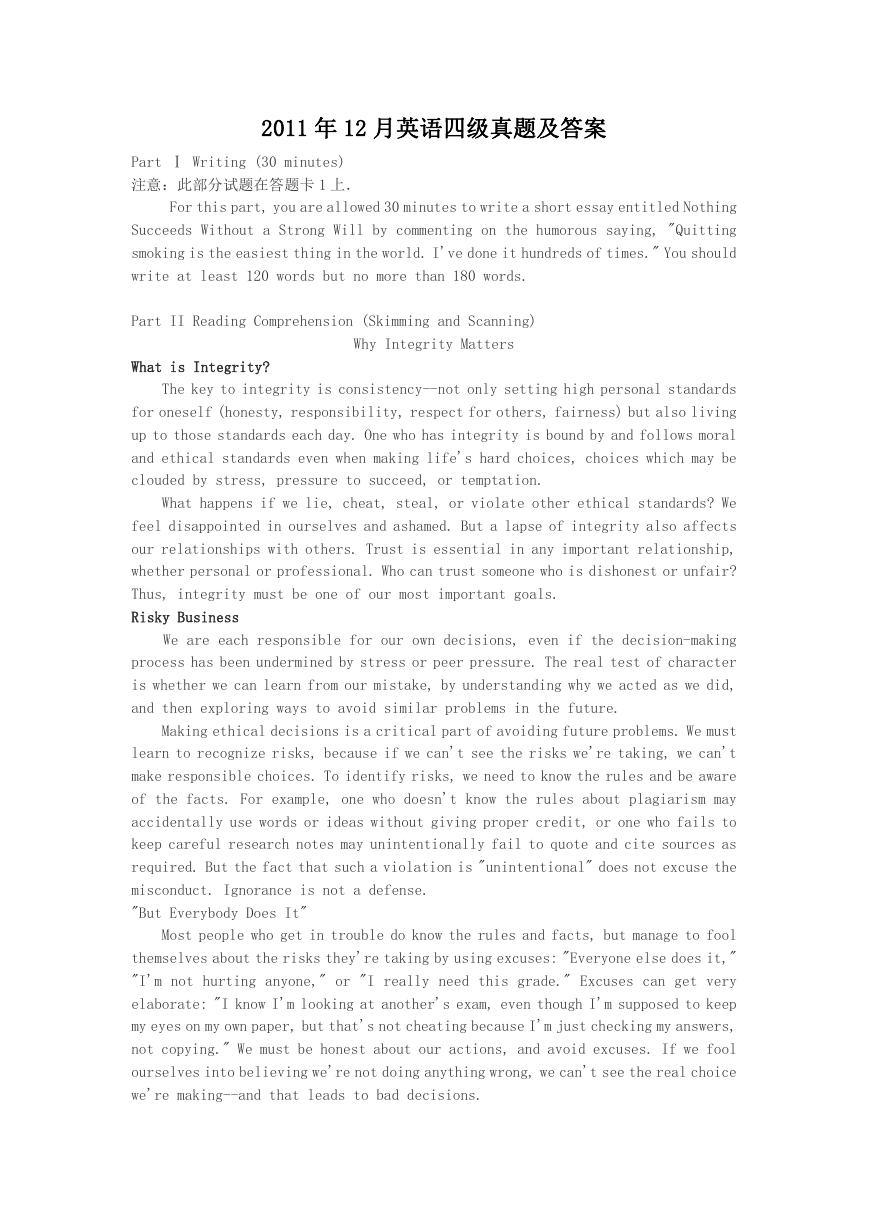
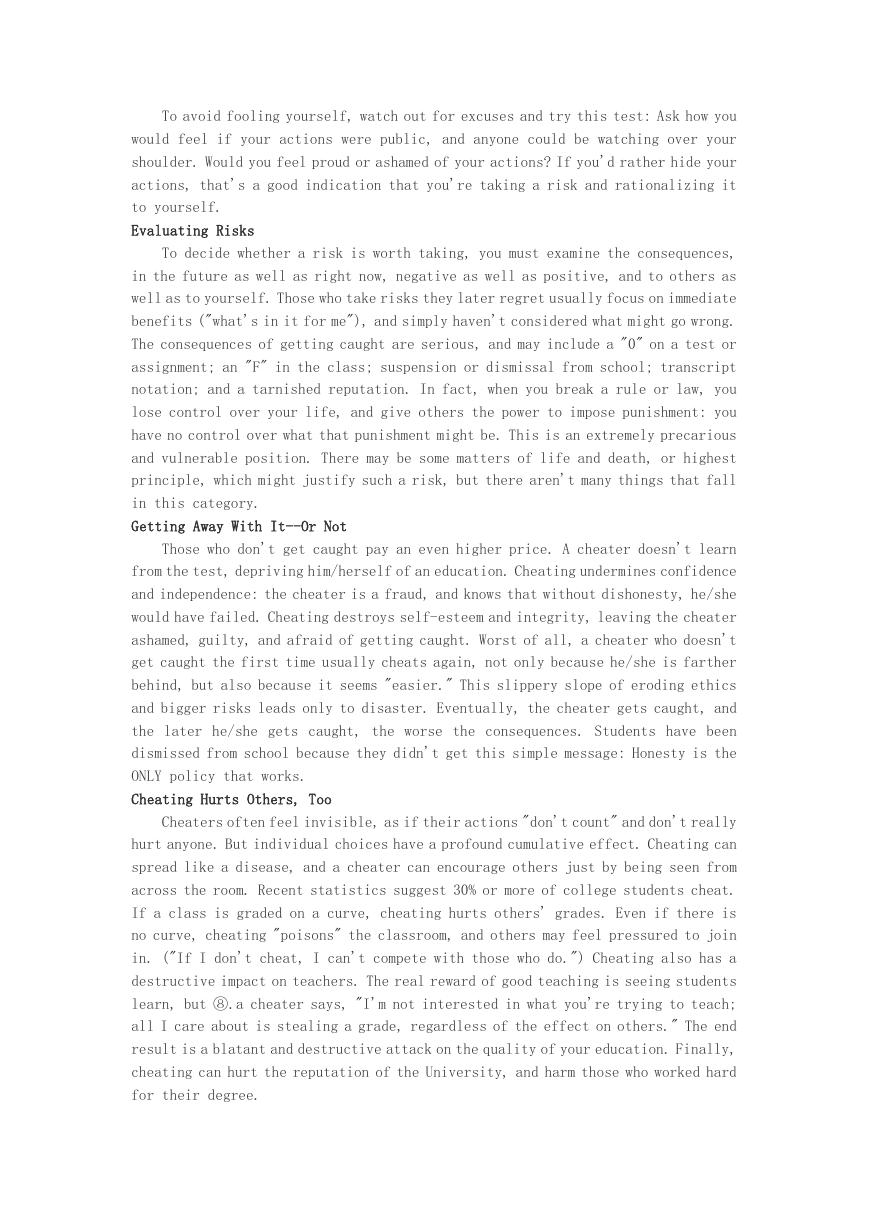
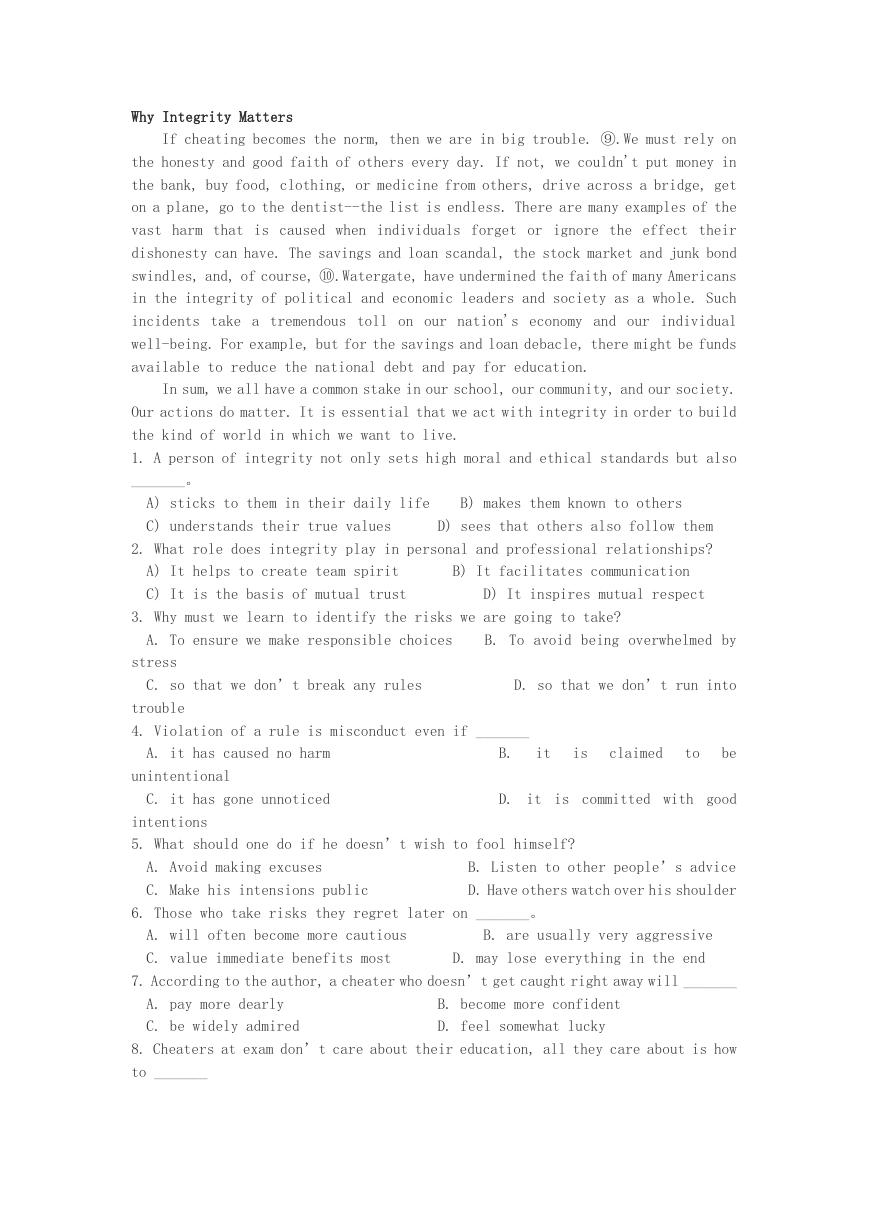
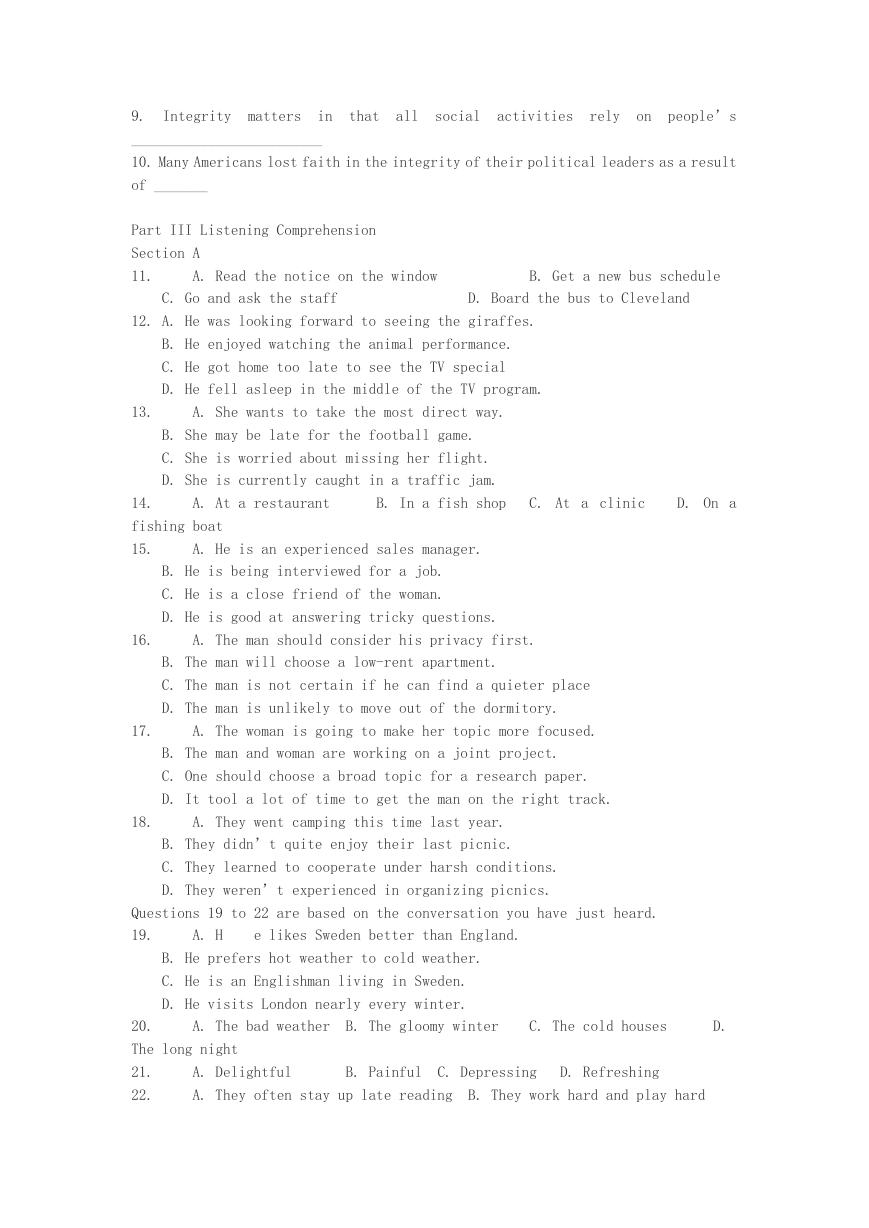
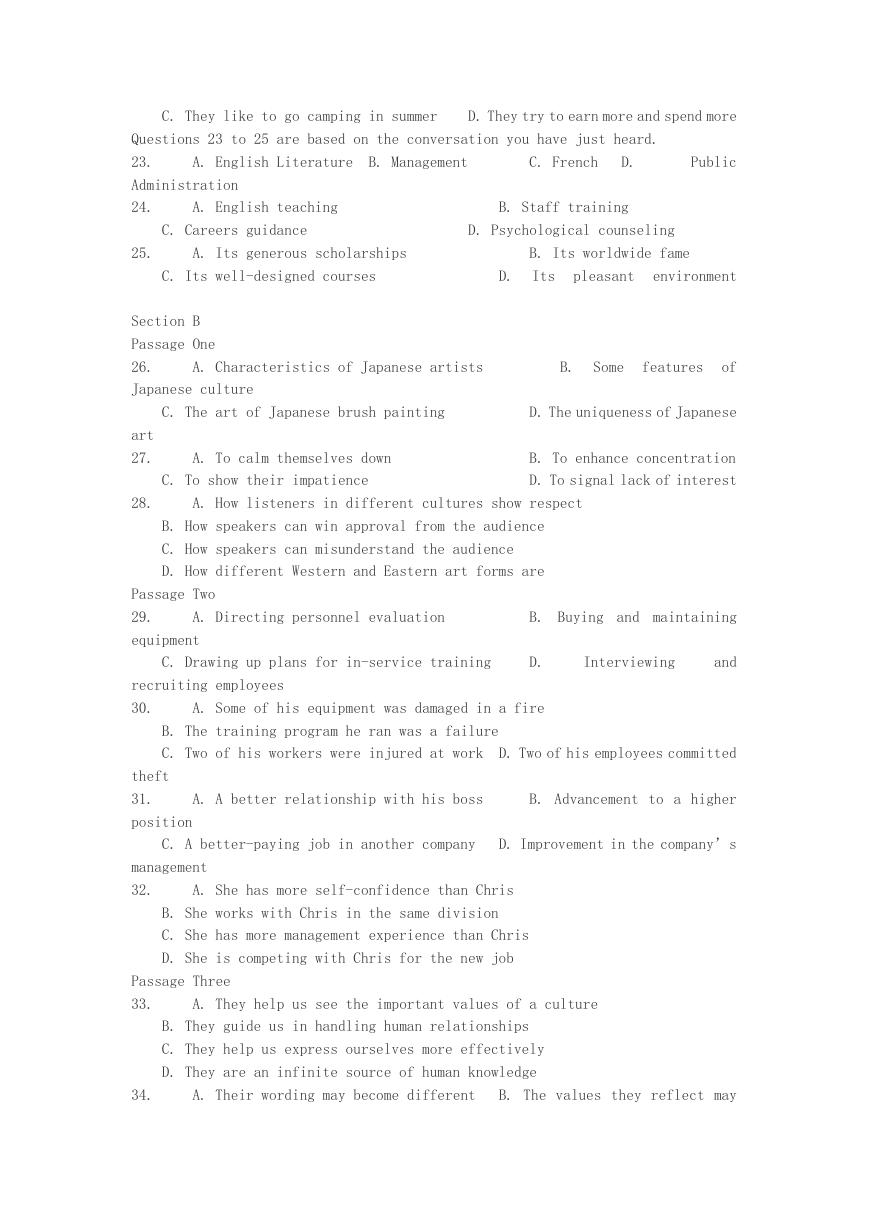
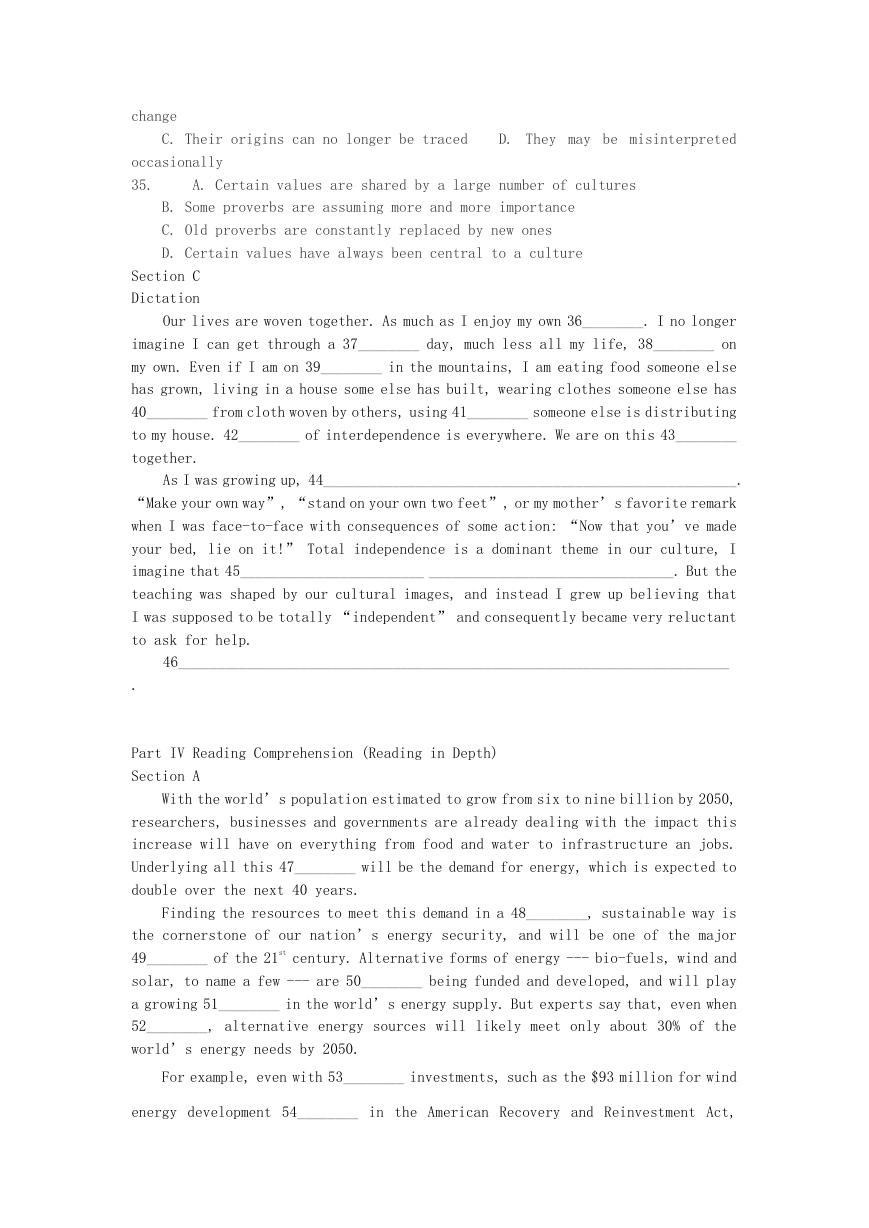
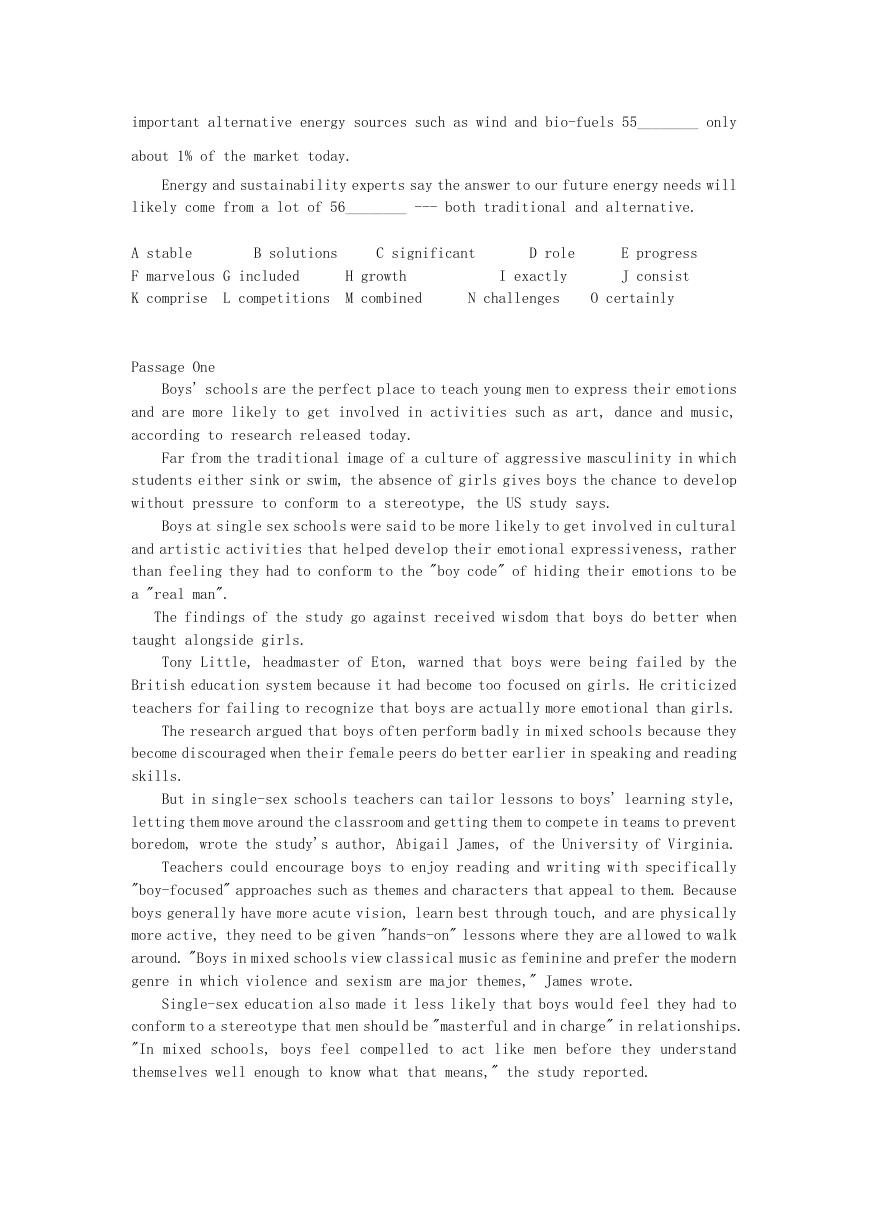
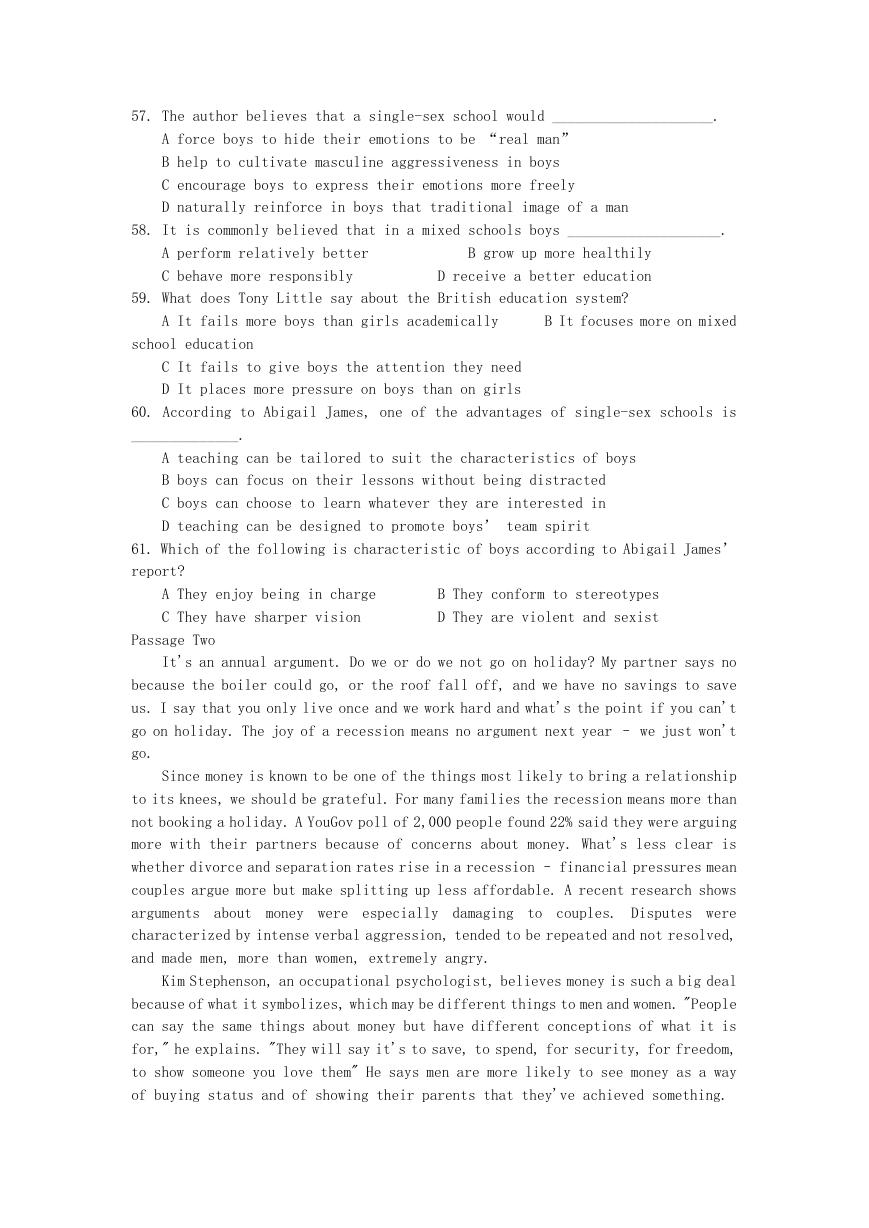








 2023年江西萍乡中考道德与法治真题及答案.doc
2023年江西萍乡中考道德与法治真题及答案.doc 2012年重庆南川中考生物真题及答案.doc
2012年重庆南川中考生物真题及答案.doc 2013年江西师范大学地理学综合及文艺理论基础考研真题.doc
2013年江西师范大学地理学综合及文艺理论基础考研真题.doc 2020年四川甘孜小升初语文真题及答案I卷.doc
2020年四川甘孜小升初语文真题及答案I卷.doc 2020年注册岩土工程师专业基础考试真题及答案.doc
2020年注册岩土工程师专业基础考试真题及答案.doc 2023-2024学年福建省厦门市九年级上学期数学月考试题及答案.doc
2023-2024学年福建省厦门市九年级上学期数学月考试题及答案.doc 2021-2022学年辽宁省沈阳市大东区九年级上学期语文期末试题及答案.doc
2021-2022学年辽宁省沈阳市大东区九年级上学期语文期末试题及答案.doc 2022-2023学年北京东城区初三第一学期物理期末试卷及答案.doc
2022-2023学年北京东城区初三第一学期物理期末试卷及答案.doc 2018上半年江西教师资格初中地理学科知识与教学能力真题及答案.doc
2018上半年江西教师资格初中地理学科知识与教学能力真题及答案.doc 2012年河北国家公务员申论考试真题及答案-省级.doc
2012年河北国家公务员申论考试真题及答案-省级.doc 2020-2021学年江苏省扬州市江都区邵樊片九年级上学期数学第一次质量检测试题及答案.doc
2020-2021学年江苏省扬州市江都区邵樊片九年级上学期数学第一次质量检测试题及答案.doc 2022下半年黑龙江教师资格证中学综合素质真题及答案.doc
2022下半年黑龙江教师资格证中学综合素质真题及答案.doc